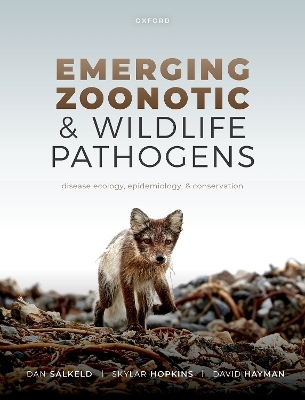
Emerging Zoonotic and Wildlife Pathogens
Oxford University Press (Verlag)
978-0-19-882593-7 (ISBN)
This accessible book describes a fascinating range of emerging infectious disease outbreaks affecting humans, including rabies, Ebola virus, Lyme disease, bubonic plague, and of course, Covid-19. The book also covers emerging infectious diseases in wildlife, such as Tasmanian devil facial tumour disease, white nose syndrome, mange, and musk ox lungworm. These case studies span the entire range of zoonotic disease emergence pathways, from sheep testicles in Wyoming, USA to butchered bush rats in Vietnam! Transmission dynamics are examined from diverse perspectives - from global drivers of pathogen emergence (including globalization, land use patterns, and changing climates) to outbreak epidemiology (epidemic curves and disease spillover), to conservation and control interventions.
Despite a recent explosion of courses on the topic, and a viral pandemic that has affected the entire world, this is the first textbook to focus on pathogen spillover ecology at the human—wildlife interface. Emerging Zoonotic and Wildlife Pathogens serves as an introduction to this multidisciplinary field for upper-level undergraduate students and graduate students interested in disease ecology, veterinary epidemiology, public health, and conservation. It will also be relevant to a broader interdisciplinary audience of conservation biologists and public health specialists, and even the interested public.
Dan Salkeld is an ecologist & epidemiologist at Colorado State University, USA, whose vagabond field research has included a suspected case of bubonic plague in Colorado, USA, a probable case of Bolivian histoplasmosis, and confirmed tick-bites in other exotic places (both geographically and physically, but mostly in California, USA). Salkeld has taught university classes on 'Ecology of Infectious Disease' and 'One Health' which have occasionally received lukewarm praise. His current research focuses on conservation and emerging infectious diseases. Skylar Hopkins is an Assistant Professor at N.C. State University, where she researches how global change affects parasites, people, and wildlife. She has a Ph.D. in Biological Sciences from Virginia Tech, where she specialized in getting stung by bees and examining snail gonads for parasites. Though much of her research involves mathematical and statistical models, she can also be found rappelling into caves to survey white-nose syndrome in bats or wrangling wild snakes to pick trematodes out of their mouths. She has only had one zoonotic disease (Lyme disease), and that was more than enough. David Hayman is a Professor at Massey University, New Zealand. Dave's research focuses on the intersection of disease ecology, conservation, and public health. He has studied emerging and neglected diseases and has had unpleasant personal experience with salmonellosis, myiasis, scabies, and malaria, among the many undiagnosed febrile, pruritic and gastrointestinal illnesses while working throughout the world. To the surprise of many he has three degrees from UK universities: Edinburgh, Kent, and Cambridge.
1: Spillover and emerging infectious diseases
2: The anatomy of disease
3: Descriptive epidemiology of disease outbreaks
4: Surveillance
5: Making simple predictions using models
6: The environment as a pathogen reservoir
7: Reservoir hosts
8: Identifying animal reservoirs during an epidemic
9: Emerging infectious diseases and globalizationDLtravel, trade, and invasive species
10: Climate change and emerging infectious diseases
11: Land use change and emerging infectious diseases
12: Impacts of emerging infectious diseases on wildlife populations
13: Infectious diseases in ecosystems
14: Infectious disease control
15: COVID-19, One Health, and pandemic prevention
| Erscheinungsdatum | 28.12.2023 |
|---|---|
| Zusatzinfo | 125 colour illustrations |
| Verlagsort | Oxford |
| Sprache | englisch |
| Maße | 190 x 246 mm |
| Gewicht | 790 g |
| Themenwelt | Naturwissenschaften ► Biologie ► Mikrobiologie / Immunologie |
| Naturwissenschaften ► Biologie ► Ökologie / Naturschutz | |
| Naturwissenschaften ► Biologie ► Zoologie | |
| ISBN-10 | 0-19-882593-5 / 0198825935 |
| ISBN-13 | 978-0-19-882593-7 / 9780198825937 |
| Zustand | Neuware |
| Haben Sie eine Frage zum Produkt? |
aus dem Bereich


